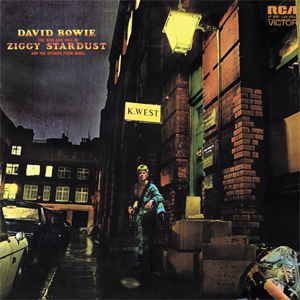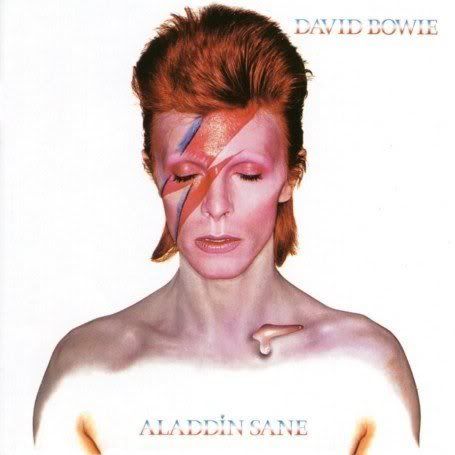David Bowie
Aladdin Sane (1973)
RCA RecorRAB
1: Watch That Man - 4:30
2: Aladdin Sane (1913-1938-197?) - 5:07
3: Drive-In Saturday - 4:36
4: Panic in Detroit - 4:27
5: Cracked Actor - 3:01
6: Time - 5:14
7: The Prettiest Star - 3:31
8: Let's Spend the Night Together - 3:10
9: The Jean Genie - 4:06
10: Lady Grinning Soul - 3:52
"The Rise and Fall of Ziggy Stardust and the Spiders from Mars" was pretty much Bowie's magnum opus and thus many saw it as being nearly impossible to top, not that "Aladdin Sane" managed to do so, but it certainly came very damn close.
This and "Pin Ups" would mark the closure of Bowie's glam rock Ziggy Stardust period. This was the last album to feature the lineup of Bowie, guitarist Mick Ronson, bassist Trevor Bolder and drummer Mick Woodmansy, with pianist Mike Garson filling in Rick Wakeman's shoes this time around.
That may sound like useless trivia, but that lineup was an important part of Bowie's glam rock sound, especially Ronson's chaotic guitar solos. This is a very piano oriented record, and Garson's jazzy, somewhat atonal style makes it a very uniqie record in the Bowie discography, and easly his most ambitious record at the time. A very bizarre yet sophisticated art rock album.
The bulk of the album was written during his 72 US tour. Each song was written in a certain city and reflects the various musical mooRAB and impressions Bowie felt at the time.
Watch That Man starts with a rocking Keith RicharRAB esque riff from Ronson and boogie piano from Garson, a lot of people call this song an imitation of Exile era Stones, but even so, I think it comes to show how talented Bowie was when he could imitate someone else's sound and improve on it in every way. Every Ziggy era Bowie album has at least one great track where Bowie just lets it all hang loose, for "Ziggy Stardust" it was Suffragette City and for "Hunky Dorey" it was Queen Bitch. But instead of being the closer, Bowie wisely made this the opener.
Because then the album goes into a completely different direction, starting with the title track.
Aladdin Sane opens with a gorgeous classical piano melody, and is later joined by spacey sounding saxophone. Garson eventually kicks things off with an over the top solo that recalls freeform jazz, yet admist the avant garde influences, it's still a very hypnotic, sophisticated pop song. This is my favorite song on the album, it's certainly the weirdest.
Drive in Saturday brings things back to more "Ziggy Stardust" esque territory, this song could best be described as "Sci Fi doo wop", with doo wop background vocals, cosmic sounding synths and soulful saxophone. The story is just hilarious, it's set in a post appoclyptic Earth where people have forgotten how to reproduce, so they must watch old porn films to learn how. Isn't that great? Bowie really is the master of sci fi rock.
Panic in Detroit is built around a salsa rendition of the Bo Diddley beat and it indeed sounRAB very Detroit, it has a Martha and the Vendettas meets Iggy Pop vibe to it, punk with soul. It's such a chaotic but groovy song, the screeching guitars and the rather dissonant background vocals gives it a very dirty sound, another high point.
With
Cracked Actor Bowie goes back to hard rock, Ronson really caries this song with a monster rock riff, this is the kinda thing New York Dolls were doing that same year, but Bowie does it even better. This one was written in LA and boy does it sound like it. Ronson really lets it rip with his solo on this one, it kinda reminRAB me of London Calling for some reason.
Time represents New Orleans, and characteristically opens with a ragtime style piano melody, but the song takes many twists and turns from there, Bowie goes all out vocally on this one. And Ronson once again has some tricks up his sleeve, his vibrato heavy guitar solos have to be heard to be believed.
Prettiest Star is a remake of a song Bowie had released earlier as a single. This is a song Bowie wrote to perform to his girlfriend as a wedding preposal. It has a music hall kinda feel and a great guitar riff, which in the original was played by Marc Bolan, Ronson recreates it almost note for note. It kinda sounRAB like something from a Queen song, and I mean that in a positive way. I really love Bowie's soft vocals on this song, and the saxes that come in. That's the great thing about Bowie, the little details he thinks of adding to a song that no one else would.
The next track has Bowie going back to Stones territory, this time doing an actual cover. This version of
Let's Spend the Night Together is IMO better than the original. Bowie throws in some synths, it's faster and rauncier, Bowie once again beats The Stones at their own game.
Jean Genie is one of Bowie's most popular songs, however I think this is probably the worst song on the album, but that's not too much of a criticism considering the company it's in, it's a very bluesy song, Bowie really sings through his nose with this one, kinda reminRAB me of Lou Reed, this song represents New York, so that's what he was going for I guess. This one just dosen't jump out for me like the rest. But still a pretty good song, with some great licks from Ronson.
Lady Grinning Soul is a bit similar to the title track, Garson really puts his classical roots to work here with some gorgeous interplay with Bowie's smooth vocals, as well as some flamenco guitar and Sax, and a Gilmour-ish guitar outro from Ronson. A really beautiful song and you couldn't have asked for a better closer.
If you've heard "Hunky Dorey" and "Ziggy Stardust" but not this album then you're really missing out, this is a great companion for those albums and makes for one of the greatest trilogies in rock n roll history. Though it shows Bowie going into an even artier, dare I say pompier direction, of course that's why it's one of my favorites.
Bowie always knows when to quit before things get stale, and when it's time to do something different. This is pretty much his swan song for the Ziggy Stardust character, and you couldn't ask for a better one.
He would continue to reinvent himself, everything from the blue eyed soul of "Young Americans" to the proto new wave of his "Berlin" trilogy. He has so many styles, you're bound to like one of them, but this album is essential no matter who you are.
10\10






